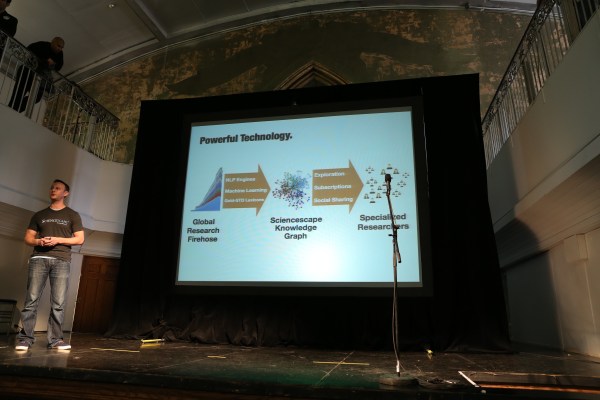Toronto-based startup Sciencescape came about because of a problem that was significant enough to lure co-founder Sam Molyneux away from a bourgeoning career as a cancer researcher, and into a new venture that wants to tackle the bigger picture issue of fixing the entire system of academic, medical and scientific research. It’s a system that’s incredibly outdated, the Sciencescape team believes, and one that’s ripe for change.
Sciencescape is trying to tackle the massive uptick in scientific research, which has exploded since the advent of the computer, in order to make it once again manageable for researchers, students and academics working on furthering their disciplines and making real breakthroughs. The startup wants to become the “plumbing” for academic and medical research, by making sense of the massive influx of data from new studies being published every day by the huge number of peer-reviewed journals out there.
The total volume of papers published each year has reached a staggering 22 billion according to a recent count, Sciencescape says, and the dollar value of the business of academic research is in the $45 billion annual range. There are tools designed to help researchers sift through all that volume already, including Pubnet.org, but these are pretty universally regarded as insufficient by the people who use them.
There are still so many chances to miss crucial bits of information, or entire tracks of research that re-cover ground. Academics place an emphasis on breaking new ground, Molyneux says, and students and researchers are constantly running the risk of reinventing the wheel or missing landmark papers because of sheer volume. To get around that, Sciencescape wants to apply intelligent sorting algorithms to incoming new publications, in order to build intelligent feeds that researchers can subscribe to, around subject matter areas, specific researchers, genes, disorders and more.
The Sciencescape engine uses natural language processing exclusively to funnel content in real-time, and is starting out with biomedical fields of study. But Molyneux says that they’re going to work quickly to expand to other fields, with specifics like law on the roadmap for upcoming additions. The system would make it easy to not only collect key research, but also visual it via graphs and charts that can show you exactly when key breakthroughs in the field have occurred, and also provides sharing options for broadcasting to other like-minded researchers via standard social network channels.
Sciencescape is emerging at a very good time in terms of drawing interest from investors and a community beyond just the academic silo; others with similar aims like ResearchGate are raising big rounds ($35 million) or achieving big exists (Mendeley to Elsevier). Sciencescape has already secured initial funding of $1.1 million, and hopes to move quickly to expand its business.
